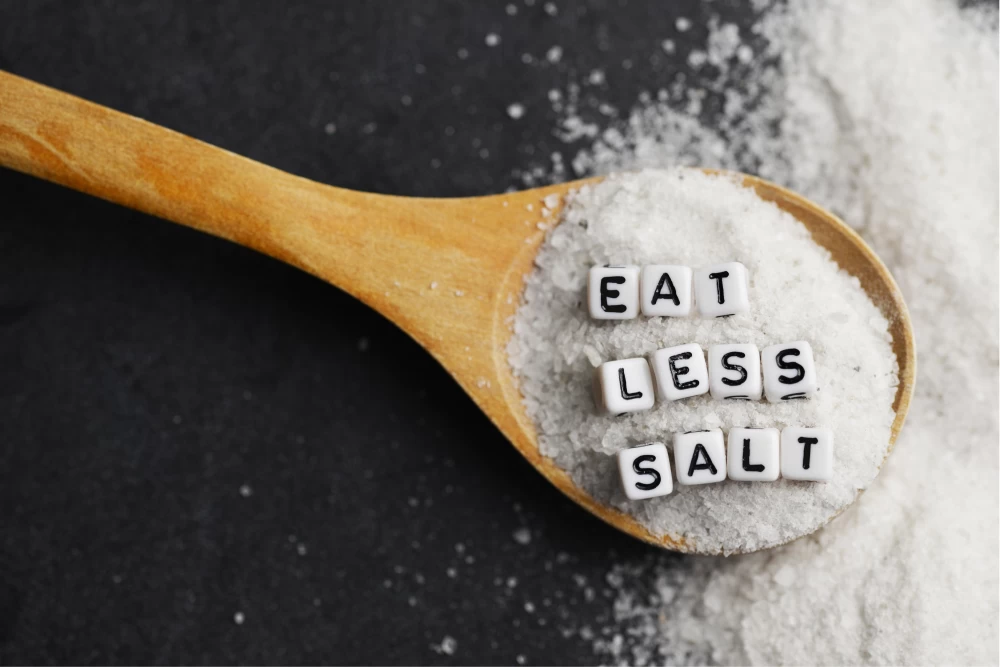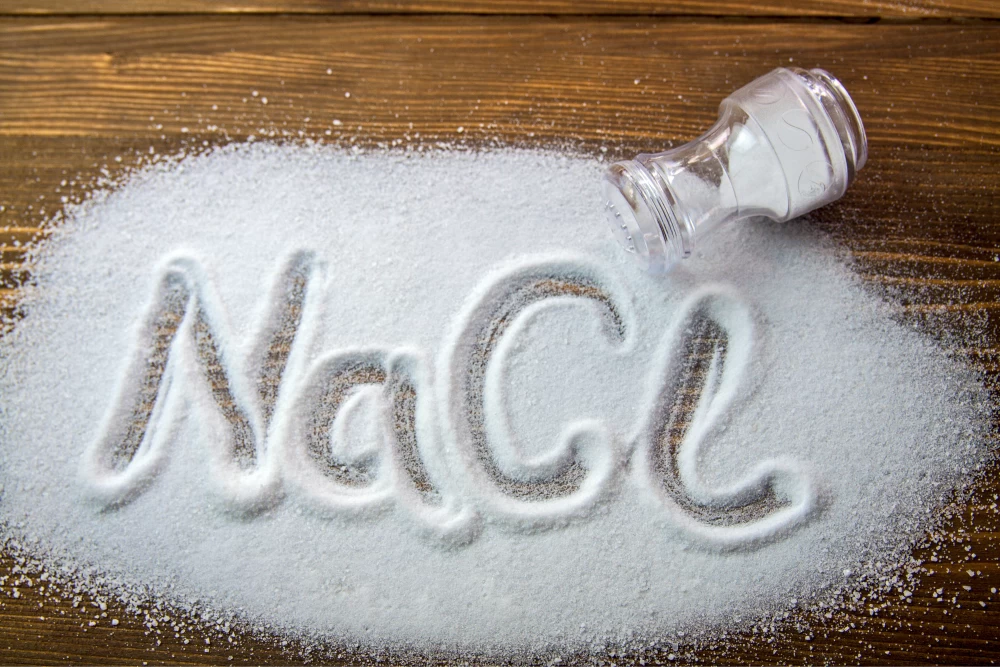
- 20th March 2023
Table of Contents
Fatty Liver and Salt
Sodium is an essential mineral that plays a significant role in various bodily functions. However, excessive intake of sodium can lead to several health consequences, including fatty liver disease. When you consume too much salt, your body retains water to help balance the concentration of sodium and other electrolytes in your blood. This leads to increased blood volume and pressure on your liver, causing inflammation and damage. Research shows that reducing salt intake can improve fatty liver disease and promote overall liver health. The American Heart Association recommends limiting daily sodium intake to less than 2,300 milligrams (mg) per day or 1,500 mg for those at risk of heart disease or high blood pressure. It's crucial to be mindful of hidden sources of salt such as processed foods, canned goods, snacks, and condiments. In conclusion, consuming too much salt can contribute significantly to the development of fatty liver disease. Reducing daily salt intake can effectively prevent or manage this condition while promoting overall health and wellbeing. It's essential to make conscious choices about the types and amounts of foods we eat by reading labels carefully and choosing low-salt options whenever possible.
Negative Effects of Too Much Sodium
Sodium is an essential nutrient that helps regulate fluid balance, muscle contraction, and nerve function. However, consuming too much sodium can lead to negative health effects. One of the most significant risks associated with excessive sodium intake is the development of a fatty liver. This occurs when fat accumulates in liver cells due to high levels of triglycerides in the blood. Research has shown that a diet high in sodium can increase the risk of developing nonalcoholic fatty liver disease (NAFLD). Another negative effect associated with excessive sodium intake is increased blood pressure. When we consume too much salt, our bodies retain water to maintain a proper electrolyte balance. This excess water puts extra pressure on our blood vessels and increases the workload on our heart, leading to hypertension or high blood pressure. Over time, chronic hypertension can cause damage to vital organs such as the heart, kidneys and brain. In conclusion, it's important for individuals to monitor their sodium intake closely as excessive consumption can be detrimental to one's overall health and well-being by increasing their risk for diseases such as NAFLD and hypertension.
Recommended Dietary Allowance (RDA) for Sodium
Excessive sodium intake is a major cause of many health issues, including high blood pressure and heart disease. The Recommended Dietary Allowance (RDA) for sodium is a daily limit that should not be exceeded. For adults, the RDA for sodium is 2,300 milligrams per day while children aged between 1-3 years have an RDA of just 1000 milligrams per day. It's important to note that people with certain medical conditions such as kidney or heart disease may require lower amounts of sodium in their diet than the RDA recommends. Additionally, some people may be more sensitive to salt than others and could experience adverse effects from consuming even moderate amounts of it. To avoid exceeding your recommended daily intake of sodium, it's important to pay attention to food labels and choose low-sodium options whenever possible. Fresh fruits and vegetables are always good choices because they are naturally low in sodium. Finally, avoiding processed foods can help reduce your overall intake of salt since processed foods tend to contain high amounts of added salt or other forms of sodium.
Factors That Affect Salt Intake
Excessive salt intake can lead to many health issues, including fatty liver disease. The amount of sodium a person consumes daily can be influenced by various factors such as age, gender, genetics, and lifestyle. For instance, men tend to consume more salt than women while older adults may have reduced sensitivity to the taste of salt leading them to add more salt in their meals. Other factors that affect sodium intake include food choices and dietary habits. Processed foods are often high in sodium content compared to fresh whole foods. Additionally, people who eat out regularly or consume fast food tend to consume more sodium than those who prepare their meals at home using fresh ingredients. In conclusion, reducing your daily salt intake can improve your overall health status and reduce your risk of developing fatty liver disease. It is essential for individuals to pay attention to the factors outlined above that influence their daily salt consumption and make necessary changes accordingly.

Impact of Added Salt on Fatty Liver Disease
Fatty liver disease, also known as non-alcoholic fatty liver disease (NAFLD), is a condition that occurs when there is too much fat accumulation in the liver. This condition affects millions of people worldwide and can lead to serious health complications like cirrhosis, liver failure, and even cancer. Recent research suggests that a high-salt diet may contribute to the development and progression of NAFLD. Excess salt consumption can cause the body to retain water, leading to increased blood pressure and fluid buildup in the liver. This can result in inflammation and scarring of the liver tissue. Reducing salt intake is one way to help prevent or manage NAFLD. The American Heart Association recommends limiting sodium intake to no more than 2,300 milligrams per day for most adults. However, individuals with high blood pressure or other health conditions may need to further reduce their sodium intake. In addition to reducing salt consumption, lifestyle changes such as increasing physical activity levels and maintaining a healthy weight are also recommended for managing NAFLD. In conclusion, while excessive salt intake has been linked with various health issues including high blood pressure and heart disease; it also plays an important role in promoting fatty liver disease by causing fluid retention which leads to inflammation of the organ tissues over time. Thus cutting down on salt intake could be beneficial in preventing or managing this condition alongside improving overall wellness through healthy dietary practices such as exercise and maintaining a healthy weight.
Strategies to Reduce Sodium Intake
1. Start with small changes: Reducing your sodium intake can be intimidating, but making small changes is a great place to start. Begin by checking nutrition labels and choosing low-sodium options when grocery shopping. Gradually reduce the amount of salt you add to meals and experiment with herbs and spices for added flavor.
2. Focus on whole foods: Processed foods are often high in sodium, so choosing whole foods like fruits, vegetables, and lean protein sources can naturally lower your sodium intake. Additionally, cooking meals from scratch allows you to control the amount of salt used in recipes.
3. Be aware of hidden sources of sodium: Sodium can be hiding in unexpected places like condiments, sauces, and even some medications. Check nutrition labels and choose low-sodium options whenever possible or consider making your own sauces at home using fresh ingredients and less salt.
Conclusion
In conclusion, it is essential to be mindful of the amount of sodium we consume daily. A high-sodium diet can increase the risk of developing various health conditions, including fatty liver disease. Consuming foods that are low in salt and incorporating more fresh fruits and vegetables into our meals can help us reduce our sodium intake. It is also important to note that reducing sodium intake should not be done abruptly but rather gradually over time. This will allow your taste buds to adjust to less salty flavors and make it easier for you to maintain a low-sodium diet in the long run. Overall, making small changes in our diets can have a significant impact on our health outcomes. By being mindful of the amount of salt we consume and making an effort to incorporate healthier food choices into our daily routine, we can improve our overall well-being and reduce the risk of developing chronic diseases such as fatty liver disease.














